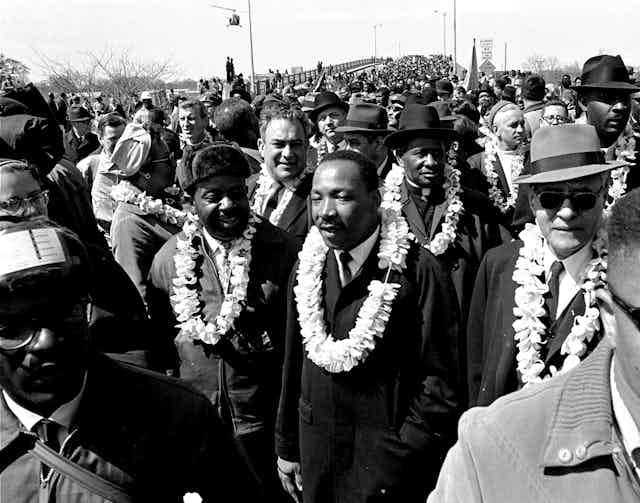Editor’s note: The following is a roundup of archival stories.
March 21 marks the anniversary of the third protest march from Selma led by Dr. Martin Luther King Jr. that culminated on the steps of the Capitol in Montgomery, Alabama, demanding voting rights for African-Americans.
As doctoral candidate at University of California, Irvine, Mary Schmitt explains, Selma was “a moment in civil rights history that played a crucial role in the passage of the 1965 Voting Rights Act.”
The first march started on March 7, 1965, but ended in violence. The second march started on March 9. The third march started on March 21, with 3,200 people under the protection of federal troops. By the time the marchers reach the state Capitol in Montgomery on March 25, their numbers had swelled to 25,000.
Scholars writing for The Conversation have emphasized the relevance of King’s nonviolent – and successful – resistance movement today.
Here are some highlights from The Conversation’s coverage.
America’s crisis today
In considering the importance of looking to the past for role models among black leaders, Bowdoin College historian Brian J. Purnell points to the many problems in American cities in the 21st century and how they have led to the emergence of different forms of protest.
“The cost of living in American cities rises each year while for decades wages for working people have flat-lined. Public schools in cities like New York City and Philadelphia are now more racially segregated than they were in the 1960s. The Supreme Court has limited policies that promoted affirmative action and voting rights.”

Purnell highlights the “Black Lives Matter” movement:
“Like the civil rights movement of the 1950s and 1960s, today’s leaders are fighting for African-Americans’ human and civil rights.”
There is also, since November 2016, “a widespread and resolute discontent with the election of President Trump,” as Managing Director of the McCourtney Institute of Democracy, Pennsylvania State University, Christopher Beem, puts it. Many protesters, he says, want to “resist” and “to stop what they see as his degradation of our democracy.”
What can the protesters learn from King’s vision?
‘All men are created equal’
King’s vision was to build a more inclusive and just community. As Beem writes,
“At the very core of the Declaration of Independence and thus at the center of American life was the belief that ‘all men are created equal.’”
Beem argues that King led one of the most successful, nonviolent resistance movements in American history. Quoting historian August Meier, Beem says, King succeeded because he was “a conservative militant.”
He was not a “conservative in any political sense,” explains Beem. King was a “democratic socialist,” who opposed the Vietnam War and also emphasized that racism in America meant the United States was not living up to its own ideals. In King’s words, American culture was “the very antithesis” of what it claimed to believe.“
"The American ideal "all men are created equal” constituted what King called a “promissory note.” In each case, ordinary citizens demanded that that promise be honored. And through their actions, the nation was made more free and more just.
By framing the cause of civil rights in words and ideas that most Americans strongly identified with, King was able to appeal to their innate patriotism. What’s more, those who stood against his cause were, by implication, the ones who could be seen as un-American.“
King fought on behalf of poor people. In fact, argues Joshua F.J. Inwood, an ethicist at Pennsylvania State University’s Rock Ethics Institute, King’s later work related to ending poverty, although that is "often ignored.” Says Inwood,
“When King was assassinated in Memphis he was in the midst of building toward a national march on Washington, D.C. that would have brought tens of thousands of economically disenfranchised people to advocate for policies that would ameliorate poverty. This effort – known as the "Poor People’s Campaign” – aimed to dramatically shift national priorities to the health and welfare of working peoples.“
King’s idea of love
What then was at the core of King’s strategy?
Scholars argue that King strove to bring people together. Howard University’s Kenyatta Gilbert has studied the preaching of African-American ministers:
"King brought people of every tribe, class and creed closer toward forming "God’s beloved community” – an anchor of love and hope for humankind.“
However, Joshuan Inwood explains, love for King was not a "mushy or easily dismissed emotion.” King advocated “agape” – “a love that demanded that one stand up for oneself and tells those who oppress that what they were doing was wrong.”
Inwood writes that agape was at the center of the movement King was building. Agape made it a
“moral imperative to engage with one’s oppressor in a way that showed the oppressor the ways their actions dehumanize and detract from society.”
Why this matters now

“Consider the following question,” writes Western New England University historian John Baick.
“What would Martin Luther King be doing if he were alive today? The Selma of 1965 no longer exists. But the Selma, or Ferguson, or Staten Island, or Cleveland of 2015 shows that history isn’t finished.”
In reviewing the film “Selma,” Baick points out how King’s skills at oratory were only one of many. He explains,
King’s voice was only one of his tools. There was his vision, his ferocity, his strategic and tactical organizing skills, and his willingness to sacrifice.
Then there was King’s humility. As Beem suggests, in another article. humility is a much-needed virtue, while pointing to the “overwhelming” scientific evidence on human biases. But humility, as he writes, also “means that you aware of your own failures, and are respectful of those with whom you disagree.”
Beem explains that King acknowledged his limited perspective. In his letter from Birmingham jail, he wrote,
“If I have said anything in this letter that overstates the truth or indicates an unreasonable impatience, I beg you to forgive me.”

